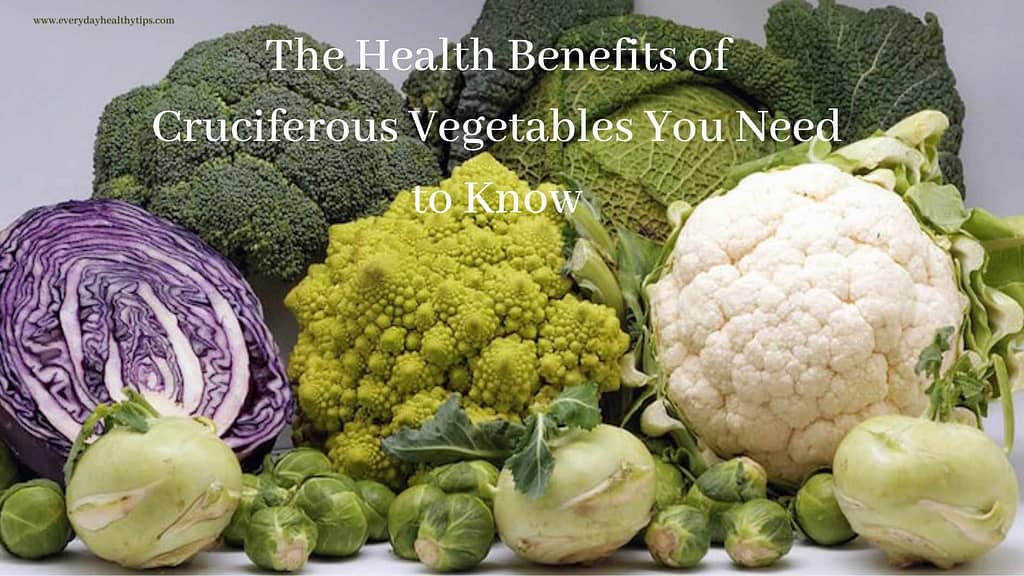There has been a lot of interest lately in the health benefits that cruciferous vegetables have, such as reducing cancer risk and maintaining healthy hormone levels.
Their renowned health benefits make these vegetables perfect for those looking to make healthier dietary decisions.
Not only are they low in calories, but they are also packed with beneficial minerals and antioxidants. This array of vegetables is quite amazing!
This delightful collection of veggies provides many health benefits! Rich in vitamins, minerals, and antioxidants, yet low in calories, they are an ideal way to give your body a boost.
Furthermore, science has linked these greens’ unique set of chemicals to many health benefits.
What Are Cruciferous Vegetables?
Cruciferous vegetables are in the Brassicaceae (or Cruciferae) family,
which has many edible genera, species, and varieties.
This particular group of plants was named “cruciferous” due to the four petals of their flowers, which bear a cross-like resemblance.
People from many different regions across the globe have highly sought-after these vegetables, originally native to parts of Europe, the Mediterranean and temperate Asia, and have now grown them.
The prevalence of cruciferous vegetables, such as cabbage, increased throughout Europe during the Middle Ages and the 16th century. This popularity was attributed to the belief that these vegetables could act as a medicinal remedy. In particular, Germans and Flemish would often consume cabbage prior to and after meals as a means of promoting better health.
Cruciferous vegetables are a widely diverse family of plants, with over 3,000 individual species. Common cruciferous vegetables include:
Cruciferous vegetables list

- Arugula (also called rocket).
- Bok choy.
- Broccoli.
- Brussels sprouts.
- Cabbage.
- Cauliflower.
- Chard.
- Collard greens.
- Daikon radish.
- Horseradish.
- Kale.
- Kohlrabi.
- Radish.
- Rapini (broccoli rabi).
- Rutabaga.
- Turnip.
- Wasabi.
- Watercress.
Reduce Inflammation
Several diseases, including arthritis and atherosclerosis, have been related to chronic inflammation.
The Journal of the Academy of Nutrition and Dietetics published research in 2014 showing that cruciferous vegetables are an effective choice for lowering inflammatory levels.
An increased intake of these vegetables was associated with a 25 percent reduction in markers of inflammation amongst 1,005 women. It is clear that cruciferous vegetables are amongst the most beneficial foods for combatting inflammation.
Enhance Heart Health
Increasing your intake of cruciferous veggies is an easy way to protect your heart health and reduce the risk of heart disease.
Eating a lot of fruits and vegetables may reduce your risk of cardiovascular disease, according to studies. A major study published in the American Journal of Clinical Nutrition followed 134,796 adults for an average of ten years, so these results are quite promising.
The results showed that a higher intake of veggies, particularly cruciferous vegetables, was linked to a decreased chance of dying from heart disease.
Cruciferous vegetables are heart-healthy due to their high mineral, vitamin, and antioxidant content. Eating more cruciferous vegetables is an easy and effective way to ensure that you are taking care of your heart.
Promote Weight Loss
If you are looking to lose weight, consuming cruciferous veggies may be a beneficial and simple way to do so. These vegetables are known to promote weight loss.
The Brigham Young University College of Health and Human Performance conducted a fascinating study in 2009.
They incredibly found that for every gram of fiber the 252 women consumed over a 20-month period, their body weight dropped by 0.5 pounds and their body fat dropped by 0.25 percent!
These vegetables are full of fiber and low in calories, which helps you feel fuller for longer and reduces cravings. Fiber also passes through the digestive tract undigested, further promoting feelings of satiety.
Help Regulate Blood Sugar
The dietary fiber included in cruciferous vegetables has been shown to aid in the control of blood sugar.
Fiber is the key to helping keep those pesky sugar spikes at bay! Studies have shown that increasing dietary fiber can slow down how quickly glucose is absorbed into the bloodstream.
That means fewer fluctuations in blood sugar which can lead to insulin resistance and type 2 diabetes. So, keep your health in check and add fiber to your diet!
Furthermore, dietary fiber and cruciferous vegetable sulforaphane may also regulate blood sugar.
Studies have demonstrated that a diet that is high in dietary fiber, as well as in sulforaphane – a compound commonly found in cruciferous vegetables. This can help to maintain healthy blood sugar levels.
Evidence suggests that in individuals with uncontrolled type 2 diabetes, sulforaphane may inhibit glucose production in the liver, leading to lowering blood glucose levels.
Improve Immunity Against Disease
It is well knowledge that edibles in the cruciferous family have a high nutritional value.
Chronic diseases like diabetes, asthma, and Alzheimer’s disease are less likely to develop in people who eat cruciferous vegetables.
Several studies have found that the nutrients in cruciferous vegetables make it less likely that you will get diseases like diabetes, asthma, and Alzheimer’s.
There is evidence to suggest that the plant-based nutrients included in these vegetables give immunostimulatory characteristics, which in turn increase the body’s defence mechanism against harmful microbes.
It has also been shown that the plant-based nutrients in these vegetables have antibacterial properties. This makes you more resistant to pathogens, which are the things that make you sick.
Conclusion
Cruciferous vegetables are a valuable dietary source of nutrition, containing a diverse range of biologically active molecules, sulfur and nitrogen-based compounds.
These compounds provide a range of nutritional benefits and are not found elsewhere in the same concentrations.
Because of all of these benefits, cruciferous vegetables have been given their own section on my Daily Dozen list.
This list says that you should eat at least one serving of cruciferous vegetables and at least two more servings of veggies every day, whether or not they are cruciferous.


